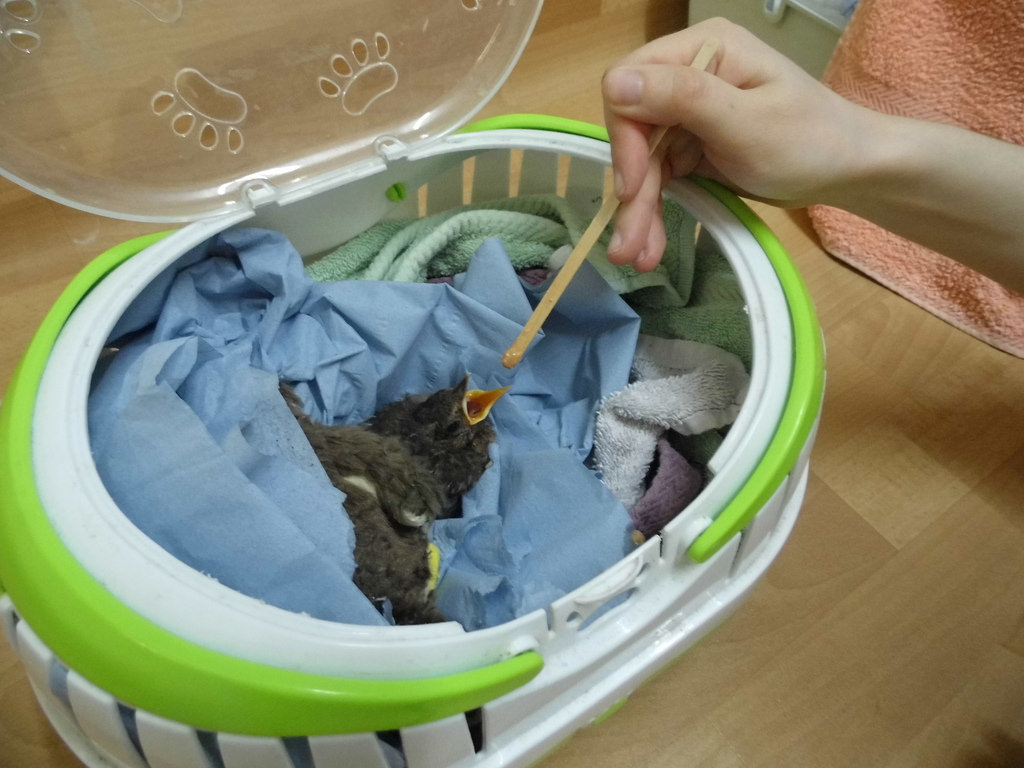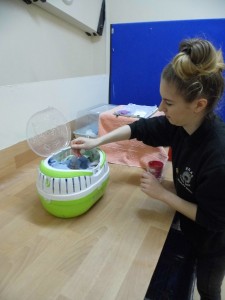
The first baby garden bird of 2014 has been admitted to East Sussex Wildlife Rescue & Ambulance Service (WRAS) during the night of 18th March 2014. The nestling blackbird was found in Polegate sat at the side of a road. The finder carefully picked it up out of concern it could get run over and took it home before calling WRAS for help and advice.
WRAS sent a nearby ambulance out on site to assess the bird and confirm that it was a youngster before bringing it into care. WRAS founder Trevor Weeks MBE took on the bird for the evening having it at home until about 10pm, ensuring the bird was given fluids using a special rehydration solution and warmed up. "It's always important to ensure any casualty is rehydrated and warmed up before attempting to feed them, attempting to do so with a cold bird will just cause additional problems" said Trevor.

The nestling bird is now at WRAS's Casualty Care Centre at Whitesmith where the charity's volunteer Orphan Rearing Team are springing into action to work shifts looking after this bird and any others which follow. WRAS's Orphan Rearing Team will be starting between 6-7am in the morning and working right through to 10pm at night. Many of the birds through the season will need feeding every 15 minutes. "At times it gets like painting the Forth Bridge, when you get to the end you have to start all over again!" explained Centre Manager Lindsay Redfern who heads the team.
WRAS is asking people to be aware of nestling and fledgling birds, and especially asking cat owners to keep their cats indoors for up to 6 hours if they see fledgling garden birds down on the ground in their garden to help reduce the volume of cat attacked birds the charity deals with every year. It is also helpful if cats are kept in an hour before dusk until an hour after dawn when most cat attack birds are caught.
There is a lot of confusion over what is a baby bird, a nestling and a fledgling, and when they should or should not be touched. WRAS has produced a basic guide which is available for people to download and keep at home.
Young birds go through three stages of development: hatchling, nestling and fledgling. Hatchlings are bald and usually come into care after being pushed out of the nest or having been taken by a predator, nestlings are partially feathered (usually bald under the wings) and are more vocal so are commonly victims of predator attacks. Both hatchlings and nestlings should remain in the nest so if you ever find one on the ground, contact your local rescue centre for advice.
Fledglings, unlike hatchlings and nestlings, are usually seen on the ground. This is completely normal and these birds should not be removed or taken into care. Fledglings are fully feathered and more mobile as they are able to hop and flutter, but cannot yet fly. Fledging is an important stage of development during which young birds will remain on the ground from 1-7 days (depending on the species) as they build up the strength in their muscles to fly. If you are worried about the safety of a fledgling then you can move the young bird into an area of cover close by - for better protection from predators - but they should never be removed from that area as their parents will still be caring for them and feeding them, although less often at this stage.
If a young bird is showing signs of illness or injury then contact your local rescue centre as they may need medication. Victims of cat attacks will need immediate treatment as a cat's mouth is full of harmful bacteria, so even the smallest wound can prove fatal without antibiotics.
If you find a bird that needs rescuing, place it a box with a towel or blanket in a warm, quiet room. DO NOT try to force feed any bird as if done incorrectly it can be fatal, keeping the bird warm will be enough until you can get the bird to a rescue centre.
Each baby or nestling bird will cost WRAS between £10 and £75 approximately depending on age, species and condition of the bird when admitted. WRAS is funded by donations so anyone wishing to contribute towards the cost of the care of these birds should call 01825 873003 to make a donation or donate online.
- END -
Press Contacts:
Trevor Weeks MBE or Lindsay Redfern - East Sussex WRAS: 07931 523958
